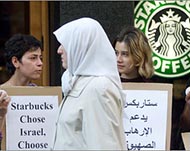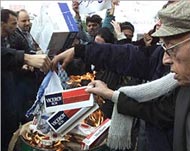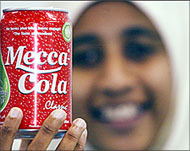Pakistanis promote boycott of US products
While many Pakistanis are embracing the “war on US products”, others believe the movement has a long way to go.

For years Naeem Ahmad wondered whether he would ever make it to the “land of opportunities”, the United States of America, a dream many young Pakistanis cherish and work towards achieving.
However, last April, a heated discussion with a group of anti-US activists brought his preparations for the long journey to an abrupt end.
“I had been planning to join two of my elder brothers settled in the US but a chance meeting with those activists opened my eyes and changed my heart,” said Ahmad recalling the dialogue with the activists campaigning against US products like Pizza Hut, KFC and soft drinks.
Political activism
The group members Ahmad talked about were part of the Islamabad-based Citizens’ Peace Committee (CPC), a private initiative born out of opposition to nuclear tests by both India and Pakistan in May 1998.
The CPC comprises renowned physicists, academics and intellectuals.
 |
|
American coffee chain Starbucks |
“This was a very difficult task, which we performed despite a string of direct and indirect threats by the local administration,” said Sameena Imtiaz, a member of the CPC, who, along with several other CPC members, faced numerous odd situations while attempting to dissuade people from eating at Pizza Hut or KFC.
The campaign was launched to protest the impending US invasion of Iraq in March this year.
“Though symbolic in nature, our campaign against the US policy of unilateralism turned out to be quite successful,” Imtiaz said. “We managed to send at least 50% of people away from these fast food chains when we told them of the US policies in Palestine and Iraq,” she added.
But the “boycott-American-products” did not remain restricted to the liberal CPC alone; most of the outspoken Islamic groups, some of whom are represented in the National Assembly, had in fact declared their “war on US products” long before the CPC did.
Economic boycotts
Annoyed over the US-led invasion of Afghanistan, these groups formed small organisations with different names in major cities, and distributed pamphlets listing alternate Pakistani outlets all over the country. These handbills urged the people to stop going to American fast food chains.
“Jews own KFC, Pizza Hut and McDonalds and it is our duty to discourage these fast food chains and eat Pakistani foods,” said a pamphlet distributed in Rawalpindi south of Islamabad by Dawat-e-Islam, one of several small and relatively unknown groups.
 |
|
Anti-US demonstrators burn |
Moreover, with the introduction of Muslim equivalents of Pepsi and Seven-Up, and Amrat Cola and Mecca Cola, these groups have an alternative to present.
“If we stop using Pepsi and Cola-Cola and promote local drinks, Amrat and Mecca Cola, it will demonstrate our displeasure over US policy of genocide against Muslims,” said a pamphlet.
The end of the fasting month of Ramadan provided Amrat and Mecca Cola with marketing opportunities.
“We can cause a severe blow to the US if the Islamic world boycotts American products such as Pepsi and Coca-Cola, a wide range of toilet accessories, cosmetics, food items including biscuits, chocolates and toffees,” maintained Maulana Jawad Ahmad, the caretaker of a mosque in Rawalpindi on the last Friday of the month of Ramadan.
Sufficiency
“We are dependent on the US right from a needle to an aircraft; they have literally become our masters and this is my rebellion against Americans,” said Muhammad Hafiz, a local student, while sipping Amrat Cola after breaking his fast.
But has the anti-US-campaign been able to dent peoples’ attitudes?
|
“Boycott will boost alternate products and generate more employment opportunities” Khursheed Ahmad, |
“Yes, I believe it did have an impact because the sales of Pepsi and Coke have gone down after the introduction of the new drinks,” said Imran Malik, who sells Amrat and Mecca Cola at his departmental store in Islamabad.
He argued that the campaign was successful because religious leaders appealed to the sentiments of common Pakistanis who feel anguished by the American policies towards Muslims in the Middle East and Afghanistan.
Cheaper prices
The cheaper prices of alternate products have not hurt the boycott campaign.
Local drinks are available for just 10 Pakistani rupees ($0.17) while Pepsi and Coke are sold for 15 rupees ($0.26) per bottle.
“Amrat Cola tastes good,” said Muhammad Sadaqat, a motor mechanic in Rawalpindi.
“Now, I can proudly say I have boycotted American products,” he said with a glitter in his eyes.
Even in many government offices, guests are being entertained with Amrat Cola. However, bottles of Pepsi and Coke are still around.
“We have now switched to Amrat Cola in our cafeteria,” said Muhammad Rana, Kitchen Assistant in Geological Science laboratories (GSL), located on the outskirts of Islamabad.
Talking back
But there are voices against the boycott campaign as well. Their opposition rests on issues of quality and competitiveness.
“Our products are not of a good standard as compared to American products,” said Anjum Jabbar, who owns a distribution and marketing company.
He wondered if Pakistani biscuits can ever compete with American Oreo and Ritz biscuits.
 |
|
Many embraced Mecca Cola |
“People buy the American biscuits though they cost double the price of a local brand,” Jabbar said. One reason for the poor quality, he said, was that Pakistani businessmen are always on the lookout for higher profits.
But for, Khursheed Ahmad, a legislator and central leader of the six-party religio-political alliance, Muttahida Majlis-e-Ammal (MMA), quality is secondary if the mission is to express opposition to foreign influence.
“Boycott will boost alternate products and generate more employment opportunities,” said Ahmad, also a member of the Institute of Policy Studies (IPS), a private think-tank.
Social symbols
|
“It is kind of a method to show off wealth in Pakistan by using imported products” Samar Haider, |
However, besides concerns for quality, status-conscious westernised rich Pakistanis are another essential factor that keeps American products afloat in local markets.
“It is kind of a method to show off wealth in Pakistan by using imported products,” said Samar Haider, an expatriate Pakistani, working in Kuwait as sales executive in Lufthansa Airlines.
He blamed successive governments for discouraging domestic industry by giving massive tax exemptions on imports.
Nevertheless, some others believe that no government can regulate social attitudes. Syeda Seema, a former research associate at the Karachi University, holds such a view.
“Pakistanis can boycott American products but they will not. We cannot resist parading and exhibiting any American or Western products that we pick up from the market,” she said.
That position, however, is the one that promoters of the boycott are working diligently to overcome.